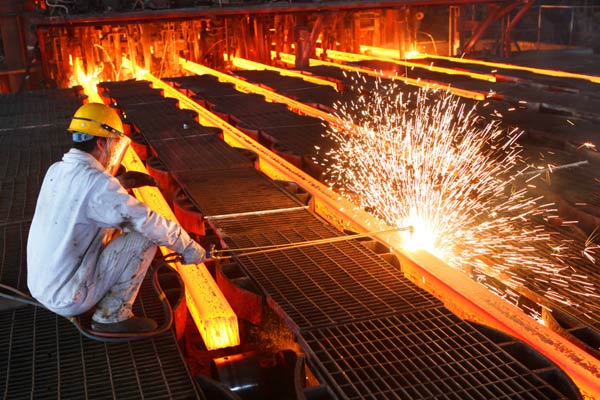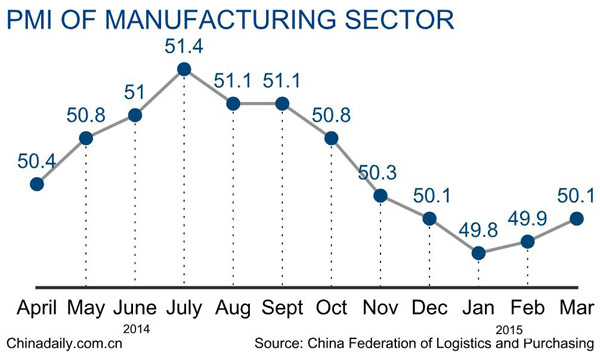 |
|
A worker cuts steel bars on the production line of a mill in Lianyungang, Jiangsu province. The HSBC flash manufacturing PMI for November dropped to 50.0 from the October final reading of 50.4, HSBC said in a report. [Si Wei / For China Daily] |
BEIJING - Chinese manufacturing business activity rebounded slightly in March to expansion territory, official data showed on Wednesday.
The manufacturing purchasing managers' index (PMI), a key measure of factory activity in China, posted at 50.1 in March, up from 49.9 in the previous month, according to the data released by the National Bureau of Statistics and the China Federation of Logistics and Purchasing.
A reading above 50 indicates expansion, while a reading below 50 represents contraction.

Related story: China's manufacturing PMI rebounds in February, by Xinhua
BEIJING - Chinese manufacturing business activity rebounded slightly in February but remained in contracted territory after falling to a 28-month low in January, official data showed on March 1.
The manufacturing purchasing managers' index (PMI), a key measure of factory activity in China, posted 49.9 in February, up from 49.8 the previous month, according to the National Bureau of Statistics (NBS) and the China Federation of Logistics and Purchasing (CFLP).
A reading above 50 indicates expansion, while a reading below 50 represents contraction.
The index last month ended a losing streak that had lasted for four consecutive months since October and showed China's manufacturing contraction has narrowed.
The PMI dropped below the 50-point mark in January, the first time since October 2012, marking looming downward pressure on the economy.
The marginal improvement was attributable to rising market demand and confidence boosted by recent pro-growth policies, such as a reserve ratio cut and tax breaks, and steady global commodity prices, said Zhao Qinghe, a senior NBS statistician.
The subindex of new order rose to 50.4 in February from 50.2 in a month earlier, while the subindex for raw material inventories climbed from 47.3 to 48.2.
But sub-indices for production, employment and delivery time dropped month on month to 51.4, 47.8 and 49.9 respectively.
"Although the PMI was slightly below 50, the production and demand continued to expand," Zhao said. He forecast the manufacturing market will see a dynamic trend soon as factories have started to resume operation after the holiday.
However, Cai Jin, vice president of the CFLP, said uncertainties existed despite encouraging signs.
China's non-manufacturing PMI, which tracks the business activities of service and construction sectors, recovered to 53.9 in February from 53.7 in January.
